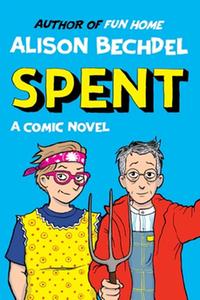How do you adapt a graphic novel into an audiobook? It has been done before, of course, but I was never tempted to listen to one.... until now.
Earlier this spring, I read, reread, and loved Alison Bechdel's latest book, Spent (HarperCollins), a sharply observed and amusing portrayal of a cartoonist (named Alison Bechdel) whose life in Vermont is complicated as well as enhanced by interactions with her partner, Holly, and found family (many of them transplants from "out of state").
 Although I've lived in upstate New York for 15 years, I'm a Vermont native who spent my first six decades watching the state change dramatically (for better or worse, depending on your perspective, though I happen to fall in the "for better" category) with the ever-changing influx of what we once called "flatlanders."
Although I've lived in upstate New York for 15 years, I'm a Vermont native who spent my first six decades watching the state change dramatically (for better or worse, depending on your perspective, though I happen to fall in the "for better" category) with the ever-changing influx of what we once called "flatlanders."
When I learned there would be a full voice cast Spent audiobook (HarperAudio) releasing this month, I wasn't sure how that would work, but the preview sample I received was promising. Now I've heard the full version, then listened again while following along with my hardcover copy. Both experiences can be summed up in my two-word review: highly recommended.
So, back to my first question: How do you adapt a graphic novel into an audiobook? Who better to ask than Bechdel, beginning with a question about her initial goals and concerns for the project.
"Well, first I had to ask myself, why would anyone buy an audiobook of a graphic novel?" she said. "For many graphic novels, an audiobook just wouldn't work. I've had people interested for some time in creating an audiobook of my graphic memoir Fun Home, for example, and I keep saying no. It's not like you can just extract the text--the drawings are integral to how the story is told. But that being said, Fun Home is very essayistic, it tells a very internal story through first person narration. Whereas Spent has lots of dialogue among the characters and a familiar dramatic structure that proceeds via scenes. And this kind of story lends itself much better to an audio adaptation."
To create an audio version of a visual reading experience, Bechdel noted that she "started playing around with the text, and it took a little while to get the hang of it but eventually I realized that I could use sound effects in much the same way that the graphic novel had used images. I'm used to working in that hybrid way, so I just had to start thinking in terms of sounds instead of drawings."
 |
|
| Alison Bechdel (photo: Elena Siebert)
|
|
Casting the roles presented another challenge. Early versions featured Jenn Colella as Alison, but other cast members weren't quite what Bechdel was looking for. "As recording got underway, I could see that some of the readers weren't really getting the lesbian voice down," she recalled. "I found it hard to describe to the producers what I meant by this--and I hate stereotyping. Is there such a thing as a lesbian voice? Do I have a lesbian voice? I feel like my voice is pretty generically feminine, but in general, I think straight women tend to modulate their voices a lot, certainly more than straight men do. Like, there's more up and down, while men stay within a flatter range. I would go so far as to say that some gay men speak with more modulation, and some lesbians speak with less. (Think Jane Lynch as the coach in Glee.)
"So, some of the women readers for Spent were just sounding too straight! At that point, Harper agreed to bring in some ringers--my partner Holly actually read for the character based on her. And Ali Liebegott, who's a writer and standup comic and wrote for Transparent (and also played this great character on the show, Tiffany the security guard, a butch dyke who rides around in a golf cart) came on board and read for the character Lois. That added a whole new dimension to the project."
When I mentioned that I'd also listened to Spent while following along in the book, melding two different reading experiences, Bechdel observed: "I actually have a fantasy that people might do that--it's just a fantasy, of course--who has that kind of time or money? But in recent years, if I find a book I really like, I will often get the audiobook, too, and toggle back and forth between the versions. If people do that with Spent, they will be rewarded, because each version has something that the other one doesn't. The audiobook has a fair number of extra lines, so it's a slightly expanded version of the story, with a few more details and jokes."
Vermont changed a lot during the 60 years I lived there as the son and grandson of marble quarry/mill workers. Bechdel has been a Vermonter since the 1990s, and I wondered what her first impressions had been and whether they had altered with time.
"It's startling to realize that I've been living in Vermont for 35 years, much longer than I've lived anywhere else," she said. "The big thing for me when I came here in 1991 was finding a place that was rural, yet felt safe to me as one of those counterculture flatlanders. There were lots of lovely rural places, but very few where I would have felt welcome as an out lesbian. But Vermont was used to all kinds of oddballs inhabiting its hollows and hills, and I fit right in here. There's been so much development over these three decades, though, so the rural character is beginning to shift a bit, at least in the area around Burlington where I live."
Spend a little time in Bechdel's corner of the state with a graphic novel audiobook that definitely has this Vermont native's stamp of approval.

